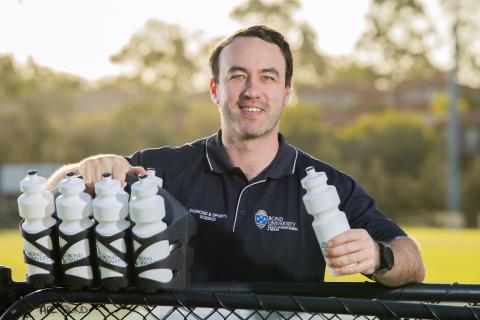
Male athletes who drink more water during training can run farther according to a new study which has implications for professional sportspeople and weekend warriors alike.
The optimal intake of fluids is 10-19 millilitres per kilogram of bodyweight, meaning a 75kg soccer player should aim to drink 750 millilitres to 1.4 litres during a training session.
Researchers from Bond University studied the hydration of 38 semi-professional rugby and soccer players during pre-season training from January to April.
They used GPS devices to record the total distance they ran, distance per minute, and maximum velocity.
Body mass, fluid intake, and sweat loss were recorded before and after each training session, and the study also monitored the ambient temperature, relative humidity and wind speed.
Players who consumed the recommended amount of water covered 7.6 percent more ground and ran 4.1 percent farther at high speeds.
Lead researcher and exercise and sports scientist Luke Badham said the biggest impact of fluid intake on training performance was in sessions longer than 110 minutes.
“We worked with two teams that are the direct step below pro-level, so these still were very high-performing athletes,” Mr Badham said.
“Some of them had played at pro level, some of them were still playing at pro level.
“It just confirmed to us that from amateurs right through to the pros, improving performance can be as easy as grabbing a drink.
“Hopefully we are changing that mindset from a few years ago when it was considered somewhat weak to get a drink – ‘Don’t worry about it boys, next drill’.”
Players in the study lost an average of 1.3 percent of body mass during the training sessions which were conducted after sundown during January to April, the hottest part of year in southeast Queensland.
Mr Badham said it was likely optimal hydration would give sportspeople an edge during games as well, but this was not always possible.
Rugby players can take water during breaks in play but there are no drinks breaks during soccer halves except in extreme heat conditions.
There are currently no fluid ingestion guidelines for team sports.
The reasons behind the performance gains are not clear but Mr Badham said previous studies found increasing fluid intake reduced cardiovascular strain in endurance athletes and the same effect may have been present in this study.
“That's why in my current study we are looking at heart rate responses during team sport training,” he said.
Until then, drinking more water remains one of the simplest ways to boost sports performance.
“You want that performance improvement, coaches want that performance improvement, let's give it a try,” Mr Badham said.